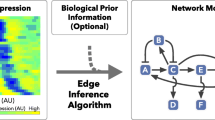Abstract
Understanding gene interactions is a fundamental question in systems biology. Currently, modeling of gene regulations assumes that genes interact either instantaneously or with time delay. In this paper, we introduce a framework based on the Bayesian Network (BN) formalism that can represent both instantaneous and time-delayed interactions between genes simultaneously. Also, a novel scoring metric having firm mathematical underpinnings is then proposed that, unlike other recent methods, can score both interactions concurrently and takes into account the biological fact that multiple regulators may regulate a gene jointly, rather than in an isolated pair-wise manner. Further, a gene regulatory network inference method employing evolutionary search that makes use of the framework and the scoring metric is also presented. Experiments carried out using synthetic data as well as the well known Saccharomyces cerevisiae gene expression data show the effectiveness of our approach.
Access this chapter
Tax calculation will be finalised at checkout
Purchases are for personal use only
Preview
Unable to display preview. Download preview PDF.
Similar content being viewed by others
References
Ram, R., Chetty, M., Dix, T.: Causal Modeling of Gene Regulatory Network. In: Proc. IEEE CIBCB (CIBCB 2006), pp. 1–8. IEEE (2006)
Zou, M., Conzen, S.: A new dynamic bayesian network (DBN) approach for identifying gene regulatory networks from time course microarray data. Bioinformatics 21(1), 71 (2005)
de Campos, C., Ji, Q.: Efficient Structure Learning of Bayesian Networks using Constraints. Journal of Machine Learning Research 12, 663–689 (2011)
Friedman, N., Murphy, K., Russell, S.: Learning the structure of dynamic probabilistic networks. In: Proc. UAI (UAI 1998), pp. 139–147. Citeseer (1998)
Eaton, D., Murphy, K.: Bayesian structure learning using dynamic programming and MCMC. In: Proc. UAI (UAI 2007) (2007)
Cho, R., Campbell, M., et al.: A genome-wide transcriptional analysis of the mitotic cell cycle. Molecular cell 2(1), 65–73 (1998)
Xing, Z., Wu, D.: Modeling multiple time units delayed gene regulatory network using dynamic Bayesian network. In: Proc. ICDM- Workshops, pp. 190–195. IEEE (2006)
Kullback, S.: Information theory and statistics. Wiley (1968)
de Campos, L.: A scoring function for learning Bayesian networks based on mutual information and conditional independence tests. The Journal of Machine Learning Research 7, 2149–2187 (2006)
Morchen, F., Ultsch, A.: Optimizing time series discretization for knowledge discovery. In: Proc. ACM SIGKDD, pp. 660–665. ACM (2005)
Chickering, D., Meek, C.: Finding optimal bayesian networks. In: Proc. UAI (2002)
Husmeier, D.: Sensitivity and specificity of inferring genetic regulatory interactions from microarray experiments with dynamic Bayesian networks. Bioinformatics 19(17), 2271 (2003)
Yu, J., Smith, V., Wang, P., Hartemink, A., Jarvis, E.: Advances to Bayesian network inference for generating causal networks from observational biological data. Bioinformatics 20(18), 3594 (2004)
Wilczyński, B., Dojer, N.: BNFinder: exact and efficient method for learning Bayesian networks. Bioinformatics 25(2), 286 (2009)
Cantone, I., Marucci, L., et al.: A yeast synthetic network for in vivo assessment of reverse-engineering and modeling approaches. Cell 137(1), 172–181 (2009)
Zoppoli, P., Morganella, S., Ceccarelli, M.: TimeDelay-ARACNE: Reverse engineering of gene networks from time-course data by an information theoretic approach. BMC Bioinformatics 11(1), 154 (2010)
Della Gatta, G., Bansal, M., et al.: Direct targets of the TRP63 transcription factor revealed by a combination of gene expression profiling and reverse engineering. Genome Research 18(6), 939 (2008)
Margolin, A., Nemenman, I., et al.: ARACNE: an algorithm for the reconstruction of gene regulatory networks in a mammalian cellular context. BMC Bioinformatics 7(suppl. 1), S7 (2006)
Author information
Authors and Affiliations
Editor information
Editors and Affiliations
Rights and permissions
Copyright information
© 2011 Springer-Verlag Berlin Heidelberg
About this paper
Cite this paper
Morshed, N., Chetty, M., Vinh, N.X. (2011). Simultaneous Learning of Instantaneous and Time-Delayed Genetic Interactions Using Novel Information Theoretic Scoring Technique. In: Lu, BL., Zhang, L., Kwok, J. (eds) Neural Information Processing. ICONIP 2011. Lecture Notes in Computer Science, vol 7063. Springer, Berlin, Heidelberg. https://doi.org/10.1007/978-3-642-24958-7_29
Download citation
DOI: https://doi.org/10.1007/978-3-642-24958-7_29
Publisher Name: Springer, Berlin, Heidelberg
Print ISBN: 978-3-642-24957-0
Online ISBN: 978-3-642-24958-7
eBook Packages: Computer ScienceComputer Science (R0)




